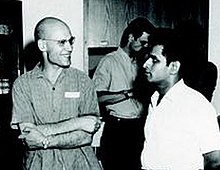22nd JULY1930 - 2nd NOVEMBER 2012 DR. SHREERAM SHANKER ABHYANKAR ( MATHEMATICS AND ROBOTICS )
- Died: November 2, 2012, West Lafayette, Indiana, United States
Shreeram Shankar Abhyankar
From Wikipedia, the free encyclopedia
| This article needs additional citations for verification. (June 2012) |
| Shreeram Shankar Abhyankar | |
|---|---|

Shreeram Abhyankar (right) with Alexander Grothendieck (left), Michael Artin in the background, at Montreal, Canada in 1970.
| |
| Born | July 22, 1930 Ujjain, India |
| Died | 2 November 2012 (aged 82) West Lafayette, Indiana, USA |
| Citizenship | United States |
| Fields | Mathematics |
| Institutions | Purdue University |
| Alma mater | University of Mumbai Harvard University |
| Doctoral advisor | Oscar Zariski, |
| Known for | Abhyankar's conjecture,Abhyankar's lemma, Abhyankar–Moh theorem |
| Notable awards | Chauvenet Prize (1978) |
Shreeram Shankar Abhyankar (22 July 1930 - 2 November 2012)[1][2] was an Indian American mathematician known for his contributions to algebraic geometry. He, at the time of his death, held the Marshalldistinguished professor of mathematics chair at Purdue University, and was also a professor of computer science and industrial engineering. He is known for Abhyankar's conjecture of finite group theory.
Contents
[hide]Career[edit]
Abhyankar was born in a Maharashtrian Konkanastha Brahmin family. He earned his B.Sc. from Royal Institute of Science of University of Mumbai in 1951, his A.M. at Harvard University in 1952, and his Ph.D. at Harvard in 1955. His thesis, written under the direction of Oscar Zariski, was titled Local uniformization on algebraic surfaces over modular ground fields.[3] Before going to Purdue, he was an associate professor of mathematics atCornell University and Johns Hopkins University.
Abhyankar was appointed the Marshall Distinguished Professor of Mathematics at Purdue in 1967. His research topics include algebraic geometry (particularly resolution of singularities, a field in which he made significant progress over fields of finite characteristic), commutative algebra, local algebra, valuation theory, theory of functions of several complex variables, quantum electrodynamics, circuit theory, invariant theory, combinatorics,computer-aided design, and robotics. He popularized the Jacobian conjecture.
Death[edit]
Abhyankar died of a heart condition on 2 November 2012 at his residence near Purdue University.[4]
Selected publications[edit]
- Algebraic surfaces, Oscar Zariski, SS Abhyankar, J Lipman, David Mumford 1995
- Lectures on expansion techniques in algebraic geometry, SS Abhyankar, B Singh – 1977 – Tata Institute of Fundamental Research
- Local rings of high embedding dimension, SS Abhyankar – American Journal of Mathematics, 1967
Honours[edit]
Abhyankar has won numerous awards and honours.
- Abhyankar received the Herbert Newby McCoy Award from Purdue University in 1973 .
- Fellow of the Indian Academy of Sciences
- Editorial board member of the Indian Journal of Pure and Applied Mathematics
- Chauvenet Prize from the Mathematical Association of America (1978)[5]
- Honorary Doctorate Degree (Docteur Honoris Causa) by the University of Angers in France (29 October 1998)
- Fellow of the American Mathematical Society (2012)[6]
See also[edit]
SHREERAM SHANKAR ABHYANKAR BIO
Shreeram Shankar Abhyankar was born in 1930, and is an Indian mathematician known for his contributions to algebraic geometry. He is the Marshall Distinguished Professor of Mathematics and Professor of Computer Science and Industrial Engineering at Purdue University. His name is associated with Abhyankar's conjecture of finite group theory. He was born in a Maharashtrian koknastha Brahmin family. He earned his B.Sc. from Bombay University in 1951, his A.M. at Harvard University in 1952, and his Ph.D. at Harvard in 1956. His thesis, written under the direction of Oscar Zariski, was titled Local uniformization on algebraic surfaces over modular ground fields. Before going to Purdue, he was an associate professor of mathematics at Cornell University. He was appointed the Marshall Distinguished Professor of Mathematics in 1967. His research topics include algebraic geometry (particularly resolution of singularities), commutative algebra, local algebra, valuation theory, theory of functions of several complex variables, quantum electrodynamics, circuit theory, invariant theory, combinatorics, computer-aided design, and robotics. He popularized the Jacobian conjecture. His current research is in the area of computational geometry and algorithmic algebraic geometry.
|

 Abhyankar Receives Honorary Degree
Abhyankar Receives Honorary Degree
No comments:
Post a Comment